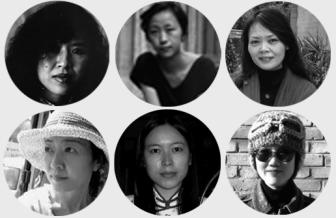Article
被遮蔽的花园:中国女诗人
Sheltered Garden: Women Poets in China

February 18, 2019
Opening any anthology, if there are any woman poets at all, the poems would mostly sound like self-pity, as if it’s women’s “privilege” to record their misfortunes; but this is due to the anthologies being edited by male scholars, a discriminative aesthetics (which has influenced women's writing to a degree). The broader historical significance in women’s poetry is often neglected. Like Wang Zhaojun, Cai Wenji (c177-c249) was also married to an emperor north of China but her poetry was certainly more than personal:
Ban Zhao (c45-c116), the first woman historian in China, a scholar of mathematics and astronomy, was also a poet:
Nonetheless, in all the anthologies of ancient Chinese poetry, Li Qingzhao has been the only woman poet highlighted. Things are not much better today. Shu Ting is the only woman poet known in the Misty generation of Bei Dao and Duo Duo. Zhai Yongming has been the only woman poet in the Post-Misty age praised by Chinese critics (Wang Xiaoni was included later). Yi Lei, an extraordinary poet and painter, enormously brave in the 1980s as a pioneer feminist poet, has hardly appeared in any anthology. Yet this is not to complain about scholars or anthologists…
(Excerpted from Herstory: Twelve Chinese Women Poets and Artists)
Who remembers Wang Zhaojun (c52-15 BCE) as the first woman poet in China? She might be talked about but only as a beauty married to a “barbarian” emperor to make peace with the northern borders.
Autumn, woods abundant, leaves are yellow and shriveled.
Birds live in the hills choiring from the mulberry bushes.
…
Huge mountains lie ahead, rivers run afar.
Father, Mother, my wedding road is hindered and long.
(From “Poetry of Complaints”)
Wang Zhaojun’s poem became the model of "Poetry of Complaints" or "Poetry of Maiden Sorrow", for which Li Qingzhao (1084-1151) was most well-known. But Wang Zhaojun didn’t sound as sad as the later women poets because she used the interjection xi兮, pronounced as “she”, like hushing or whispering, sometimes like a crying out in agony, a poetic style in the Chu Kingdom of China.Opening any anthology, if there are any woman poets at all, the poems would mostly sound like self-pity, as if it’s women’s “privilege” to record their misfortunes; but this is due to the anthologies being edited by male scholars, a discriminative aesthetics (which has influenced women's writing to a degree). The broader historical significance in women’s poetry is often neglected. Like Wang Zhaojun, Cai Wenji (c177-c249) was also married to an emperor north of China but her poetry was certainly more than personal:
When I was young my country was peaceful,
then soon afterwards the Han fell into decline.
Heaven was unkind, allowing wars and separations,
earth was unkind that I had to face with such a time,
with spears and swords everywhere, and roads dangerous,
refugees fleeing to exile, in sadness and sufferings.
In the dusty wildness, many people were captured
by the barbarians, virtues were gone and so was courage.
How could I accept the alien customs and be a barbarian wife?
Humiliated and abused day and night, who could I turn to?
I sing to my hujia and play my instrument,
but no one heard my anger and my grief.
(From “Eighteen Songs of Hujia”)
Heaven was unkind, allowing wars and separations,
earth was unkind that I had to face with such a time,
with spears and swords everywhere, and roads dangerous,
refugees fleeing to exile, in sadness and sufferings.
In the dusty wildness, many people were captured
by the barbarians, virtues were gone and so was courage.
How could I accept the alien customs and be a barbarian wife?
Humiliated and abused day and night, who could I turn to?
I sing to my hujia and play my instrument,
but no one heard my anger and my grief.
(From “Eighteen Songs of Hujia”)
Ban Zhao (c45-c116), the first woman historian in China, a scholar of mathematics and astronomy, was also a poet:
In the seventh year of the Forever Juvenile,
I accompanied my son to move east of the capital.
It was early Spring and the sun was shining,
a good day to depart and to start our long journey.
We set out by taking a carriage in the morning
and took a rest at a small inn after sunset.
Having left the capital where we lived so long
I felt like a swallow under someone else’s eaves.
Struck by this feeling I stayed awake till daybreak.
(From “Journey to the East”)
I accompanied my son to move east of the capital.
It was early Spring and the sun was shining,
a good day to depart and to start our long journey.
We set out by taking a carriage in the morning
and took a rest at a small inn after sunset.
Having left the capital where we lived so long
I felt like a swallow under someone else’s eaves.
Struck by this feeling I stayed awake till daybreak.
(From “Journey to the East”)
Nonetheless, in all the anthologies of ancient Chinese poetry, Li Qingzhao has been the only woman poet highlighted. Things are not much better today. Shu Ting is the only woman poet known in the Misty generation of Bei Dao and Duo Duo. Zhai Yongming has been the only woman poet in the Post-Misty age praised by Chinese critics (Wang Xiaoni was included later). Yi Lei, an extraordinary poet and painter, enormously brave in the 1980s as a pioneer feminist poet, has hardly appeared in any anthology. Yet this is not to complain about scholars or anthologists…
(Excerpted from Herstory: Twelve Chinese Women Poets and Artists)
© Ming Di
Sponsors





Partners
LantarenVenster – Verhalenhuis Belvédère

